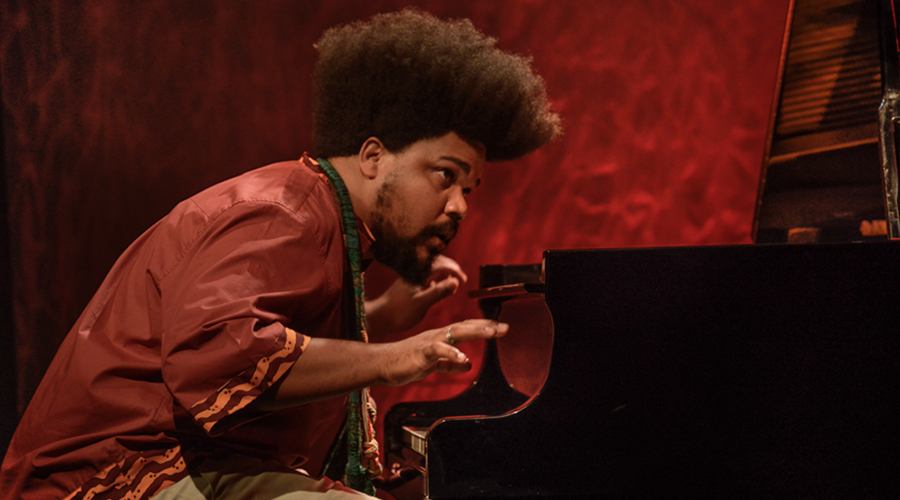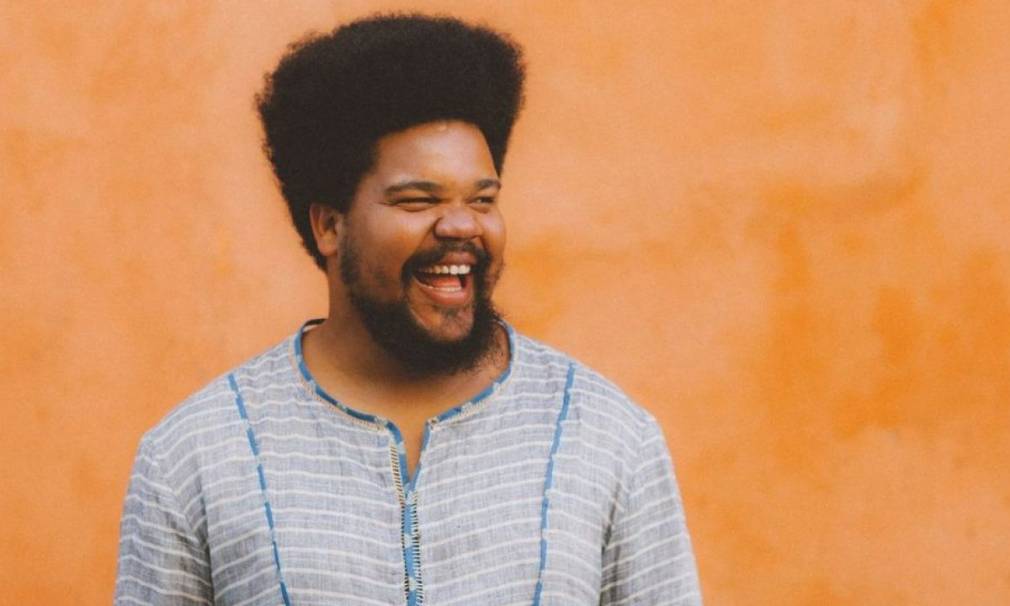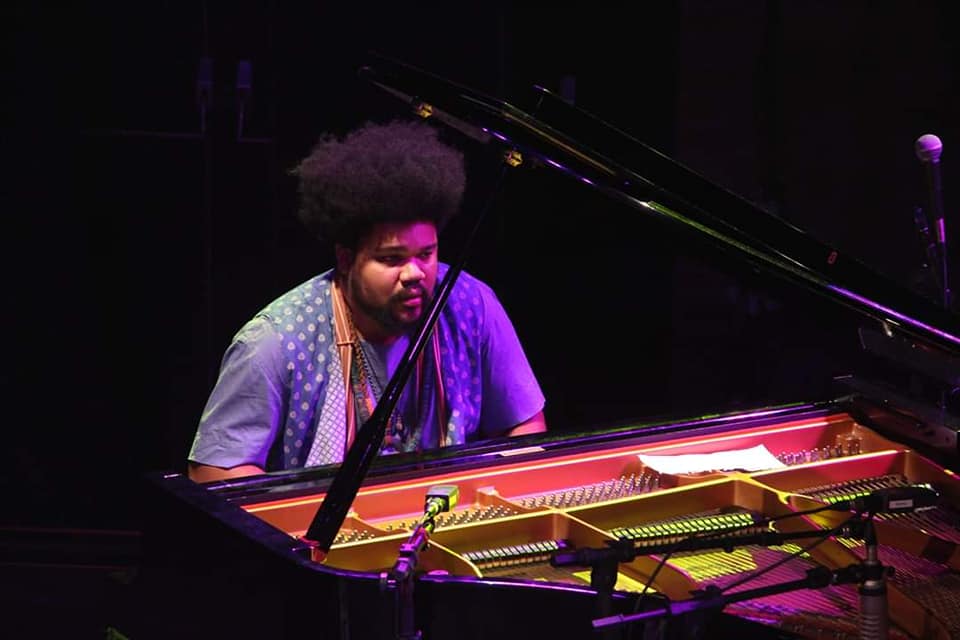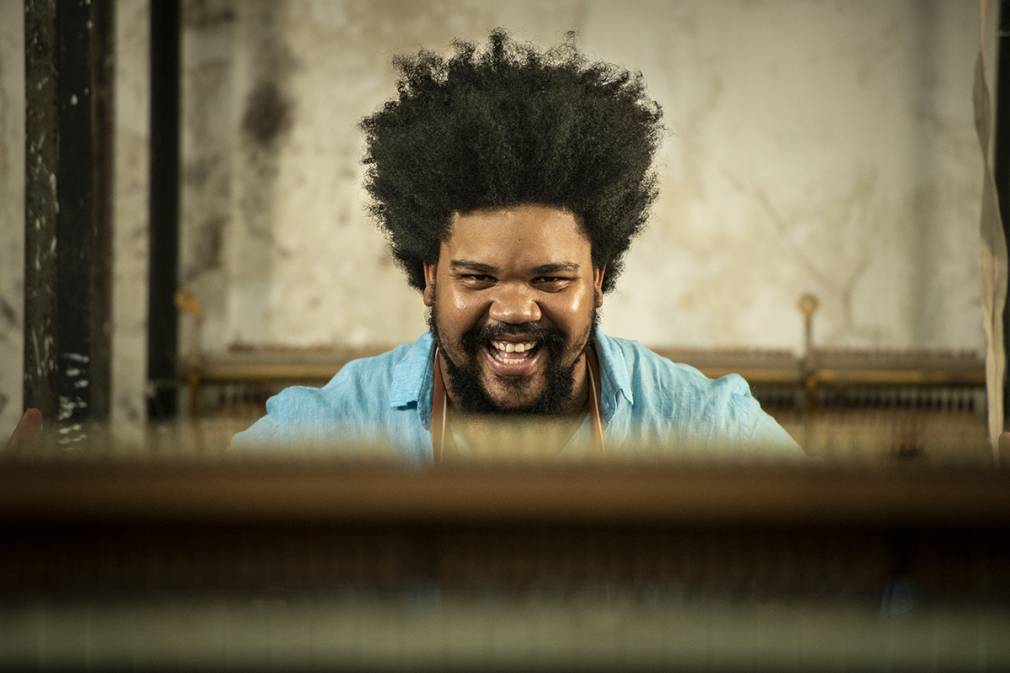In a world of new walls built on the foundation of filter bubbles and social algorithms, nothing can describe Amaro Freitas’ career better than “barrier breaker”. Praised all over the world for his first two albums, Sangue Negro and Rasif, his talent on the piano was described by Downbeat as an “approach to the keyboard that’s so unique it’s startling”. A rising star of the Brazilian jazz, he has toured Europe and the USA two times. His third tour, planned for this year, was suspended due to the COVID-19 pandemic.
At 29, his biography is as strong and soulful as his music. Though today he is a rising star gaining world recognition as a promising young composer and musician, his past was not so full of sunshine. Amaro was born in Recife, a city bathed by the Atlantic Ocean and with a population of over 1,5 million people. Best known for its multicultural carnival and its vast litoral, Recife is the capital of the state of Pernambuco and one of the main cities of the Northeast of Brazil.

The city hosts the first synagogue of all the Americas, secular public markets, and – unlike other Brazilian regions – a 16 year history of dutch governance in the 17th century. The intense flow of European people (heightened by f its proximity to the continent), the diverse indigenous presence, and landing of different African tribes shaped the distinct soul of the city: a tropical mix of cultural influences that results in diverse folklore, rich history, and stunning music and cinema.
Despite it all, Recife is a deeply unequal city – a systemic feature of the country. Almost 20% of the people live in slums, facing higher rates of violence and little assistance from the public services. It was in one of these slums, on the border of a hill, where Amaro grew up. There he learned what would become the first lesson along his journey: the daily life of the ghetto and the music of the pentecostal churches. In a context of social vulnerability, his parents – Jeremias and Rosilda – found a sparkle of hope in the pentecostal churches through education and safety.
“This diversified my repertoire. I was beside the boys who smoke weed and beside the religious ones; I was listening to the Christian chants and also listening to the Pagode and Brega songs played by my neighbors”, tells him.

In the church, he found his passion for music. The first instrument that blew his mind was the drums: “I would like to play the drums, but it was the most disputed instrument at the church, so I had to try the keyboards – the instrument that my father played”, remembers him, adding that he used to make his own drums in-home, using buckets. The results of his first enchantment can be heard in his music: his percussive approach to the piano has a unique style while he explores the polyrhythms.
One day, while he was in the house of the conductor of the church’s music group, he had his first contact with jazz. “He played a DVD of Chick Corea and when I listened to that music for the first time I was guided to new ways, to new sensations: the modulation, the tones, the improvisations, the freedom… Today, when I play jazz, I feel this! I can express my feelings through the sounds!'”
Hearing jazz changed Amaro Freitas’ life forever. After that, he aimed for a spot at the Music Conservatory,and got it. Unfortunately, he could not keep up his music studies because his family couldn’t afford the 30 BRL (about 5 Euro in nowadays exchange) monthly fee. Amaro, however, never gave up. Amaro used to go to a barbershop of a neighbor to learn music theory from him, while the neighbor was cutting hair and shaving his clients. After that, he left the church because of the religious restrictions of playing in clubs. He got a job as a telemarketing assistant and as a waiter in a pizza restaurant to pay for his graduation in Phonographic Production.
“I chose Phonographic Production because I saw it could help me better to improve my career. Also, in that times I was finding more about the traditional music from Pernambuco and the program of the Music graduation at the Federal University of Pernambuco wasn’t based on local music, but in 17th-century European music, and that was not what I would like to study”, Amaro says.

Amaro met Jean Elton (bass) and Hugo Medeiros (drums) at that time and saved money for more than 3 years until he had enough money to go to the studio. From this partnership as a jazz trio Sangue Negro was born, recorded at Carranca Studio, produced by Rafael Vernet and released in 2016 (being re-edited in Brazil in vinyl this year, with a preface written by Ed Motta). The album won the best album prize at MIMO Instrumental 2016 and was acclaimed by music critics and jazz fans around the world. “Sangue Negro changed my life in the music business”, Freitas remarks.
The album is really a pearl of contemporary jazz, far from what the world of music business usually expects from Brazil: bossa or samba based jazz. Without excluding the bossa reference – seen in “Samba de César”, for example – Amaro Freitas prints his own identity onto the music and focuses on mixing the Pernambuco rhythms, like Frevo, with inspiration from Thelonious Monk, Chick Corea, McCoy Tyner, and other masters.
Following the success of the first album, Amaro signed with 78 Rotações Management (that also manages artists like Azymuth) and with Far Out Records to release his second album: Rasif. The name, an Arabic word that can mean pavement or wall, and source of the name of Recife city, reveals the purpose of the recording: to spread to the world an authentic jazz that praises the roots of Pernambuco music. Even more intense, Amaro brought to jazz Baião and Frevo and the impact of the African-rooted maracatu (usually played by lots of drums) to the piano.
“The music business, sometimes, expects from Brazil only samba or bossa based music, or the exotic-labeled music to dance. I am happy to see my music being played and to highlight the Brazilian conceptual jazz to the world”, says Amaro.

All the acclaim of Rasif made a successful tour around Europe and the USA possible, playing in some of the main jazz clubs worldwide. These results, however, do not let him free from racism. “I remember the sensation of being applauded, at night, in a specific city in Europe, and receiving discriminatory looks during the day”. Even in Brazil, he says, “I arrived to play in a place and a person asked me if I was the guy who carries the piano”.
But breaking the barriers is a mark of Freitas’ talent. After all the challenging experiences he’s gone through, things like that are only new steps to shape his prodigious career. In 2020, despite the suspension of his tour, he kept playing and recording performances for online festivals. He is featured on the EP Existe Amor, released this year, beside Milton Nascimento, Criolo and Arthur Verocai. Amaro rearranged the tracks “Não Existe Amor em SP” (composed by Criolo) and “Cais” (composed by Milton Nascimento and Ronaldo Bastos) and recorded piano for both.
Amaro’s third album is being planned now. Despite not actually owning a piano, Amaro devotes, sometimes, 8 hours a day to studying the piano (especially at the Carranca Studio). The pandemic stopped his tour. But, just like previous adversities, it can’t stop his talent.




